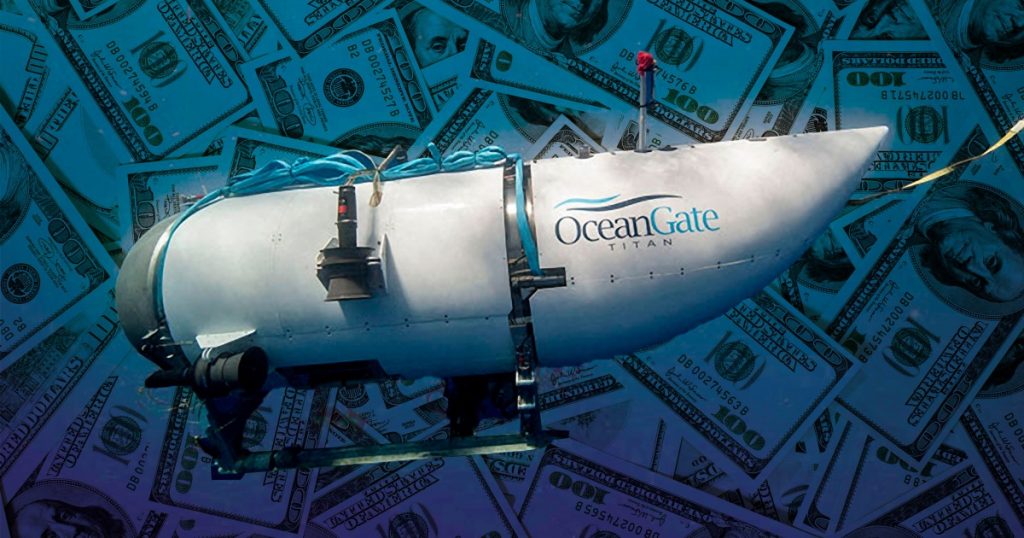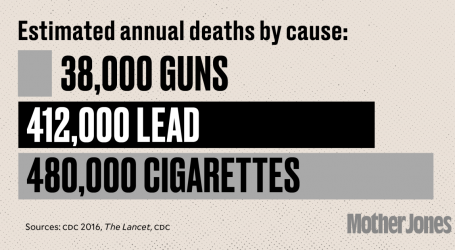Meet the Internet Gamblers Who Won Big Betting on the Submarine’s Fate
Mother Jones illustration; OceanGate/ZUMA; Getty
Fight disinformation: Sign up for the free Mother Jones Daily newsletter and follow the news that matters.Before debris was discovered on Thursday, Titan, the submersible that took tourists to view the wreckage of the Titanic, the looming tragedy was fodder for widely-enjoyed, if often macabre, internet content. Some Twitter users ripped jokes about the rich getting their just desserts. Others intently scanned social media for updates. And bettors saw an opportunity.
Since Wednesday, users of Polymarket, a crypto-based futures trading platform, wagered over $300,000 on whether the “missing submarine” would “be found by June 23.” Naturally, this prompted online discourse about the ethics of profiteering from an event that was likely to turn out fatal.
“[W]hat stage of capitalism is investing in someone’s death,” one Twitter user asked, posting a screenshot showing Polymarket’s evolving spread on the submarine. The sentiment hit a nerve, and the post went viral, accruing over 9,000 retweets and over 150,000 likes. “Actually insane. Imagine making money off of if someone is gonna die or not,” another user wrote in a reply that was liked over 1,000 times. Others started criticizing Polymarket directly for opening up the sub market.
Truth is, you can bet on almost anything on Polymarket: propositions as light as where French soccer superstar Kylian Mbappé will play next year; ones as as dark as whether Russia will detonate a nuclear bomb by 2023 (betting “yes” and expecting to collect seems like a leap of faith); and the bizarre, like taking odds on if a former sexual partner of NBA power forward Zion Williamson will release a sex tape. So it’s not surprising that a global news story ended up generating bets on the platform. But I still wanted to know just what kind of person sits down and bets on the outcome of the fate of a submarine and the people inside of it. Are they calculating sickos? Financially efficient “eat the rich” types? Clear-eyed hustlers trying to make it in a precarious economy? All three?
Two Polymarket bettors who took positions on if the Titan would be discovered or not—one that it would, and one that it wouldn’t—agreed to shed some light on such questions, but on the condition I not use their real names. I’ll call them Rich and Brian.
“It started as straight-up gambling around the 2016 election cycle,” Rich, a PR professional in New York told me over text message. Many media professionals and forecasters thought that Hillary Clinton had the election in the bag, but Rich realized he wouldn’t be surprised if Trump came out on top. He bet accordingly, despite being a “lifelong Democrat.”
“I did super well that year and decided to just stick with it as long as I was in the black,” he says. Rich’s bets supplement his regular income, with winnings going to vacations, gifts, and other splurges. Rich says he’s gotten more analytically rigorous, and that he avoids markets he doesn’t have much expertise in—like weather—favoring politics and economics.
Brian has been betting full-time since 2007, coming to it after a post-college stint as a full-time poker player. He started on Intrade, an online predictions market that shuttered in 2013, took a brief break to trade stocks, but returned to betting when a more regulated predictions market, PredictIt, launched in 2014. “I probably could have made a lot more money if i just went into finance, but this is much more fun lol,” he told me in a Twitter direct message. Brian also mostly sticks to politics.
Rich bet that the sub would not be found. Why? “I got into this market, frankly, because a lot of the expert analysis was indicating they were already dead. A pretty broad consensus, and the market was being artificially deflated by more hopeful laymen’s takes,” he explained.
Brian bet “Yes” because he’s an optimist and was moved by the story.
Sorry, just kidding! Brian is exactly as calculating as you might expect. “At 10c[ents], I think ‘Yes’ is probably correct,” he explained, citing a figure meaning that the market believed there was 10 percent likelihood of the submersible being found in time. “At 20c, I think ‘No’ is probably correct. So it’s price dependent. These are just slightly educated guesses. My assessment of the event could be totally, totally wrong.”
Both of them generally don’t tell others about their betting or what they’re betting on. Rich admitted that wasn’t the case this time, and that “I did get some grief from my partner on the submarine market.” He says he “similarly took a lot of flak for betting on Trump in 2016—despite being an ardent Democrat.”
“I think my ability to be dispassionate about the market’s topic is what makes me fairly successful at it,” he says. He pointed to other examples in politics, like one of Trump’s impeachments, where liberal bettors weighed in based on their desired outcome and created an irrational market that he took advantage of.
You might think these guys are sick freaks. They’re both well aware of the sentiment and have their own justifications.
“My answer would be that markets are fundamentally immoral. There’s no ethical consumption under capitalism,” Rich said. He also made the point that, unlike markets that people think are immoral—like buying defense contractor or oil stocks—betting that the sub wouldn’t be found has zero impact on the outcome. Buying such stocks does at least fractionally bolster the value of the business.
Brian sees where people are coming from. In fact, his first reaction was that a betting market on the sub was inappropriate. But he changed his mind after reading the description of the wager’s terms. As Brian explains, it was “solely about locating the submersible, not about anything with the fate of the passengers…Those two facets of the event are very different things.” He also compared his actions to how cable news journalists talk to experts and try to suss out what’s likeliest to happen—their own form of odds making, he suggested.
We now know, thanks to reports based on Navy underwater monitoring systems, that the vessel imploded long before early on Thursday, when I first spoke to Rich and Brian. But at the point, things looked bad for any kind of rescue. There were reports of unexplained banging noises, but the passengers had likely already run out of air. Bets against the sub being found by June 23 were sitting at 90 cents, and bets for it being found sat at around 10 cents.
The odds flipped as the Coast Guard confirmed that it had discovered debris from the sub on the ocean floor, which technically gave victory to those who bet the submersible would be “found.”
Despite taking opposite sides of the bet, thanks to clever playing of the odds, both Rich and Brian came away with thousands of dollars.
“I did end up making like $8k in the market, just because ‘Yes’ was so cheap and the odds were so lopsided,” Brian said.
“Came out with $3250. After fees it will work out to a bit less than 15%,” Rich said. “All thanks to the hubris of man!”




